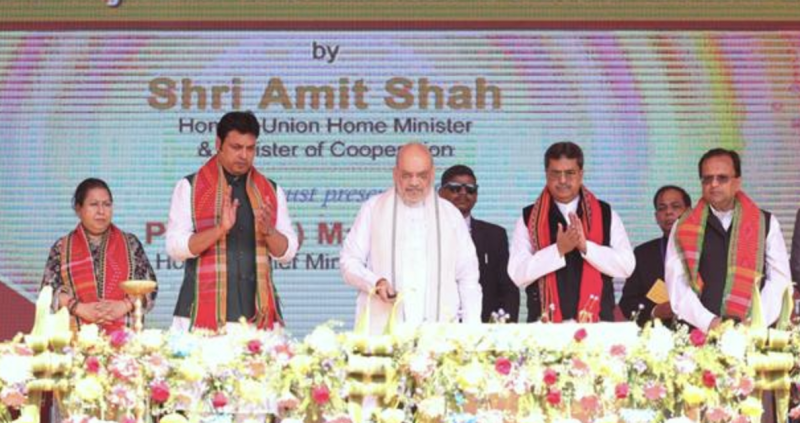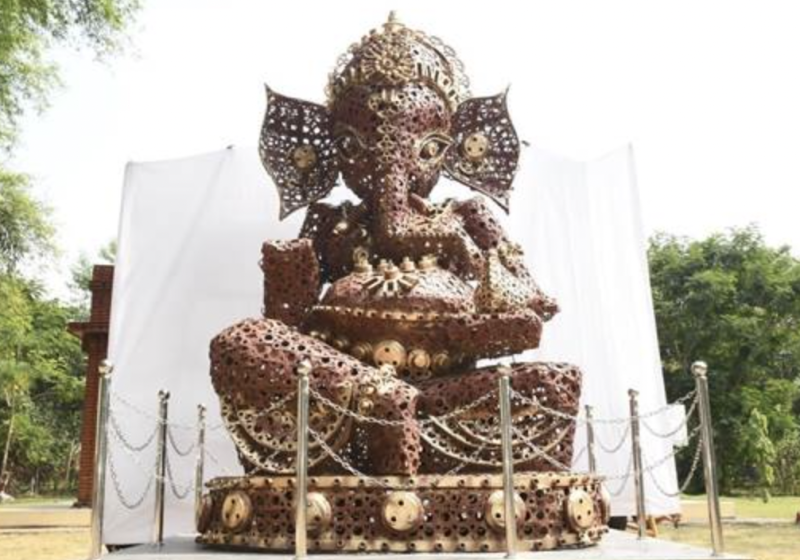Union Home Minister and Minister of Cooperation, Shri Amit Shah, today inaugurated and laid the foundation stone for various development projects worth over ₹668 crore in Dhalai, Tripura. Shri Amit Shah interacted with the Bru Reang community at the Haduklau Para Bru Settlement Colony (BRUHA PARA) in Dhalai and also visited their homes and met them. On this occasion, the Chief Minister of Tripura, Prof. (Dr.) Manik Saha, the Union Home Secretary, the Director, Intelligence Bureau and Director General, Bureau of Police Research and Development (BPR&D) were also present.
In his address, Union Home Minister said that under the leadership of Prime Minister Shri Narendra Modi, the central government has facilitated the settlement of 38,000 people from Bru Reang community. He said that for nearly 25 years, the Bru Reang brothers and sisters, who have been living in extremely difficult conditions, did not have access to basic facilities like water, toilets, electricity, education, employment, and healthcare. He said that those who had ruled here for a long time never saw the pain of the Bru Reang people, but Modi Ji saw, understood, and addressed their suffering. Shri Shah mentioned that when change occurred in Tripura and their party formed the government, at that time there was also a government of Narendra Modi Ji at the center. He said that due to the agreement made at that time, 40,000 people were resettled, and provisions were made for employment, healthcare, education, clean drinking water, toilets, and cooperatives for women. He added that during the tenure of the previous government, many schemes were made, but they never materialized on the ground.
Shri Amit Shah said that not only did Prime Minister Modi make a plan for the Bru Reang brothers and sisters, who have been living a worse life since 1998, but also resettled 11 villages at a cost of ₹900 crore. He mentioned that these villages now have electricity, roads, drinking water, connectivity, solar street lights, subsidized grain shops, anganwadi schools, and health centers. Prime Minister Modi Ji has ensured that the people living in these 11 colonies are provided with all the rights, just like any other citizens of the country. Shri Shah added that these people have been included in the voter list, and the Modi government has also provided them with ration cards, health cards, and cooperatives to ensure their employment. He further added that these people now own plots of 1200 square feet, and with the help of the Government of India, their homes have been built. Additionally, the Modi government is providing them with a monthly assistance of ₹5000 for 24 months.
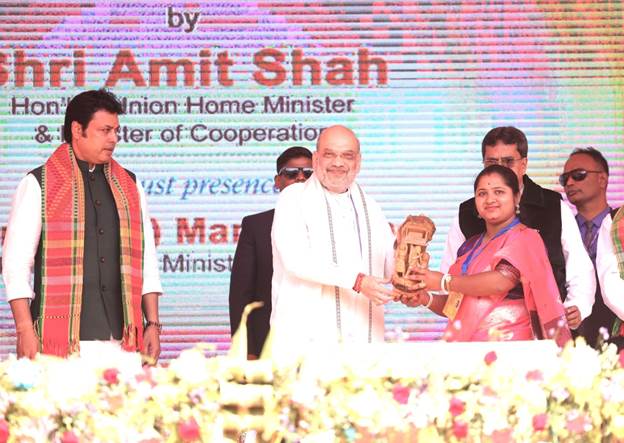
Union Home Minister and Minister of Cooperation said that during the tenure of the previous government, only 2.5% of people had access to drinking water, whereas today 85% of households have tap water. Earlier, no poor person received free ration, but today, under Modi Ji's leadership, 82% of the people in Tripura receive 5 kg of rice for free. Shri Shah mentioned that the Modi government is covering the entire healthcare expenses for 80% of the people in Tripura, up to ₹5 lakh. He further added that investments are coming into Tripura, roads have been built, and electricity and toilets have reached every household. The dropout ratio in Tripura has decreased to below 3%, and enrollment has increased from 67% to 99.5%.Shri Shah said, the Modi government and the Tripura government have shown that when those who believe in democracy come to power, it leads to the development of the country and the state. He emphasized that the government of Narendra Modi Ji at the center, and the governments of Shri Biplab Deb Ji and now Prof. (Dr.) Manik Saha Ji in Tripura, are driving forward the work of development. The construction of the grand temple of Maa Tripura Sundari is underway, which will make it easier for devotees from all over the world to have darshan of the goddess.
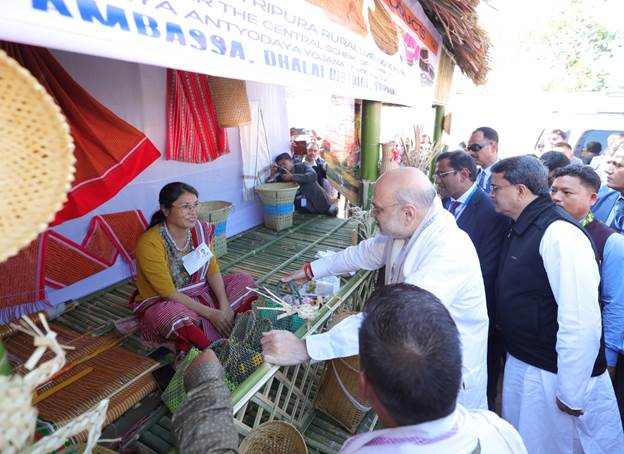
Shri Amit Shah said that today Tripura is peaceful and violence has ended. He said, the Modi government restored peace in the state by making three agreements with the rebel groups of Tripura and one with the Bru Reang community. He further stated that today, Tripura is moving forward on the path of development shown by Modi Ji, with peace.
Union Home Minister and Minister of Cooperation today laid the foundation stone for several development projects, including the Central Detective Training Institute (CDTI) in Agartala. The objective of this important initiative by the Ministry of Home Affairs is to strengthen security in the northeastern region and neighboring countries, and to establish high standards in policing. It is noteworthy that during the 69th plenary session of the North Eastern Council (NEC) held in Shillong, a recommendation was made to establish an academic research center in collaboration with educational institutions to study the unique security challenges of the northeastern region.
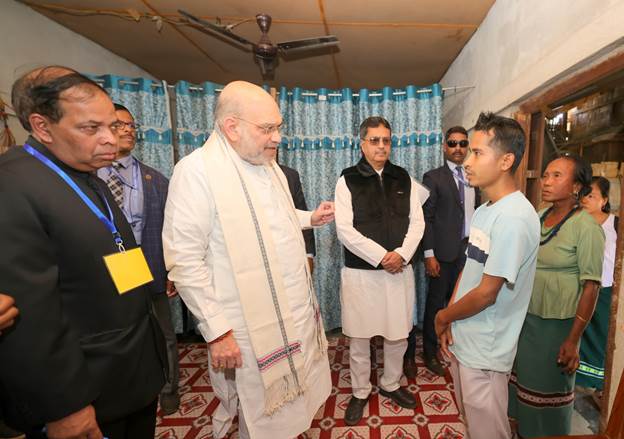
The Government of Tripura has allocated 9.57 acres of land in the Jirania sub-division of West Tripura district, for this institute. The Ministry of Home Affairs has approved ₹120 crore for the construction of infrastructure. The digital survey of the allocated land has already been completed. The CDTI in Agartala will train over 6,000 personnel annually from the northeastern states and Central Armed Police Forces (CAPFs). The institute will be equipped with state-of-the-art facilities such as advanced classrooms, simulation labs, IT data centers, and practical training areas, which will provide police personnel with modern skills.
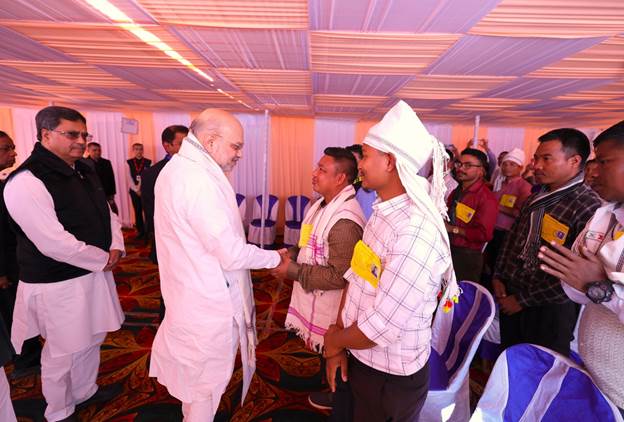
This institute will provide high-level training and research facilities on internal and national security issues in the Northeast. The institute will also have a dedicated academic research center, which, in collaboration with academic institutions, will study key security challenges such as counter-terrorism measures, border management, human trafficking, drug trafficking, illegal migration, and arms smuggling.
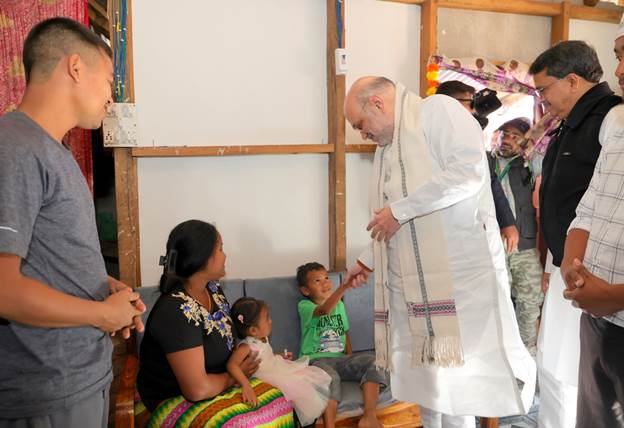
The CDTI being established in Agartala will not only enhance the capacity of police forces but also promote international cooperation to effectively address cross-border security challenges.
